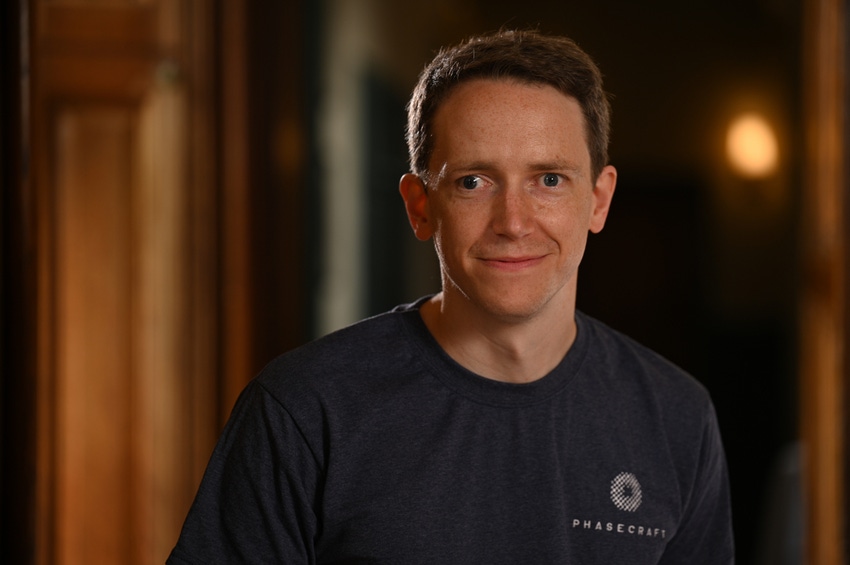
Connects decision-makers and solutions creators to what's next in quantum computing
Quantum for Bio Team Targets Treatment for Muscle-Wasting Disease
Q&A with Phasecraft co-founder and CEO Ashley Montanaro

Quantum algorithm company Phasecraft is partnering with the University of Nottingham and quantum hardware manufacturer QuEra to develop a new treatment for the muscle-wasting disease myotonic dystrophy.
Wellcome Leap, a global organization that helps fund health breakthroughs, has awarded the team $1 million through its $50 million support program Quantum for Bio, which aims to accelerate applications of quantum computing to address pressing human health challenges.
In this exclusive Q&A with Enter Quantum, Phasecraft co-founder and CEO Ashley Montanaro discusses the program and how the company plans to use recent fundraising to target genuine quantum advantage.
Enter Quantum: What is the background to this project?
Ashley Montanaro: Wellcome Leap is a program set up by the Wellcome Trust, which looks at several different technologies that might be able to produce breakthrough applications in healthcare. In the context of quantum computing, they are looking at ways in which it could significantly impact healthcare applications in the relatively near future and it has funded several different teams from all over the world to look into this.
We were fortunate to be funded together with collaborators at the University of Nottingham and QuEra to look at using quantum computers to model the molecular systems that are important in drug design and drug discovery in the particular context of a condition called myotonic dystrophy.
What part do Phasecraft’s algorithms play in the drug discovery process?
We are experts in what you can do with near-term quantum computers. An application area that we find very exciting and promising is modeling quantum systems using a quantum computer – using quantum computers to understand the quantum mechanical interactions within a physical system.
We've spent a lot of time thinking about materials systems – like batteries and solar cells – but molecular systems like the ones that are important in drugs are particularly promising as well. We have several techniques that we think are going to be very important in this domain.
These include understanding how to encode the problem that you are studying very efficiently on a quantum computer and ways in which you can separate out the quantum part and the classical part and use the quantum part as input to the classical part to make it very efficient. We also spend a lot of time on quantum simulation and modeling algorithms themselves and we think by putting all these pieces together, you can make a significant impact on the timescales with which you may be able to solve these drug modeling problems.
How will you be working with your partners on this project?
Phasecraft is providing the quantum algorithms, the underpinning theory and the software development. Our collaborators at Nottingham are experts in classical computational chemistry and have experts who understand myotonic dystrophy. QuEra has a world-leading hardware platform based on neutral atoms and they are going to be providing us with access to that during this project and their expertise in making the algorithms perform as well as they can on that platform.
How does a hybrid solution of quantum and classical hardware work in this instance?
This is called quantum mechanics/molecular mechanics (QM/MM) modeling. The idea is that there are some physical systems where you don't need to think about them quantum mechanically, and classical models do a perfectly good job of modeling that behavior. But there are others where strong quantum correlations play an important role, so we need to think about the quantum mechanics of the system.
In this QM/MM approach, you have a very large scale model that is doing the molecular mechanics and then at a smaller scale, you have the quantum mechanical model that's handling to a much higher level of precision the quantum effects. A natural way in which quantum computers can interact with classical ones is that the quantum computer handles this fine-grained QM level and then interfaces with classical molecular modeling.
What are the other applications for quantum molecular discovery?
We’re extremely excited by materials because we think that quantum computers could genuinely help us discover better batteries and solar cells in the near future. Beyond this, we have done some work on near-term optimization algorithms, solving hard constraint satisfaction problems on a quantum computer, which might have relevance in domains such as electronic design, automation, or maybe computational finance, as well.
In August, Phasecraft raised $16 million in funding. What is your goal for that?
This is going to enable us to push towards our goal of practical quantum advantage. We��’re seeing this really interesting phase in the development of quantum computers where they have outperformed classical supercomputers, but only for contrived problems that are designed for quantum computing.
We want to get to the point where quantum computing is genuinely useful for problems that people care about. This investment is going to enable us to support and grow our R&D team as we push towards this milestone over the next few years.
About the Author(s)
You May Also Like
.png?width=100&auto=webp&quality=80&disable=upscale)
.png?width=400&auto=webp&quality=80&disable=upscale)




